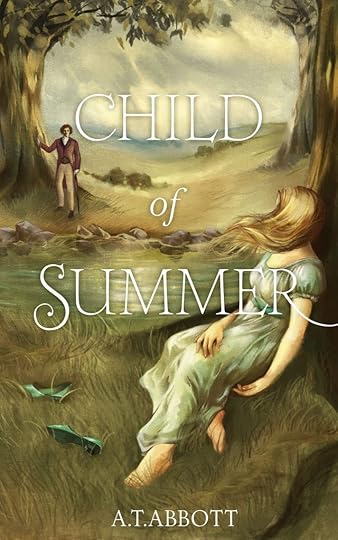This is a most unusual book – one with no reviews or ratings on Amazon or Goodreads (at the time I read it). That means it’s a complete blank slate, and I have no idea what to expect. But the blurb is intriguing and the cover is lovely (and most unusual) so I’ll give it a go.
 Almost at once, there’s a problem. The hero, Robert, Viscount Childes, attends a ball. He’s engaged, but he appears to be having a sexual relationship with his future wife, even though he plans to take a trip to India before the wedding, a journey of at least a year. What on earth is she supposed to do if she falls pregnant, and he’s on the other side of the world? Yet he seems quite pleased with himself, and his pal thinks he’s a bit of a lad. I can’t imagine any Regency gentleman with pretensions to honourable behaviour acting that way, yet we’re told throughout the book how honourable he is.
Almost at once, there’s a problem. The hero, Robert, Viscount Childes, attends a ball. He’s engaged, but he appears to be having a sexual relationship with his future wife, even though he plans to take a trip to India before the wedding, a journey of at least a year. What on earth is she supposed to do if she falls pregnant, and he’s on the other side of the world? Yet he seems quite pleased with himself, and his pal thinks he’s a bit of a lad. I can’t imagine any Regency gentleman with pretensions to honourable behaviour acting that way, yet we’re told throughout the book how honourable he is.
However, off he goes to India, whereupon the neglected lady promptly jilts him and marries someone else (because she was pregnant? We’re not told, but I wouldn’t be surprised). Four years later he returns, now bumped up in rank to the Earl of Hartfield since his father’s death, and attends the same ball and sees a lady there he danced with four years ago, Eveline Parish. Then she was lively and friendly; now she’s cold and distant. There was some scandal about her, but he doesn’t know what. Whatever could have caused such a great change in her?
When Rob bumps into her (literally) she’s being verbally set upon by a group of women, including Rob’s former betrothed. Rob rescues her, but she’s offhand with him. He’s intrigued by her, and sets out to befriend her, even though he doesn’t really know what the scandal is surrounding her. This doesn’t go too well, and ends up with Evie being on the receiving end of even more abuse from women. Whatever did she do?
And all the while, Rob and Evie are drawn to each other and very rapidly falling in love – or rather in lust, because this is not a sex-free read. There are some surprisingly passionate kisses early on, with the inevitable effects, and later in the book there are some long-drawn-out graphic sex scenes, which I confess I skipped over. There’s also a fair amount of robust language, of anachronistic forthrightness, including the f-word. We’re definitely not in Kansas here. I don’t mind that, although it does knock me right out of any semblance of Regency atmosphere, especially when it’s the ladies running around shouting ‘Bollocks!’.
What I did mind, very much, was the title errors. It’s not that there was much that was outright wrong, exactly, just that it was confusing. I spent quite a lot of time trying to work out exactly why Evie’s mother is Lady Eugenia, especially as her brother is Sir Elias Stone. That’s not impossible, but it’s very, very odd. Titles like Lady Eugenia, Lord Edward and Lady Jane are not simply polite forms of address to the upper classes, they actually mean something. Only the daughter of a duke, marquess or earl can call herself Lady Eugenia. Only the younger son of a duke or marquess can call himself Lord Edward, and since he’s the son of an earl, his correct title is the Honourable Edward Ainsley. And ‘Lady Jane’ is the Dowager Countess, so her correct title is Lady Highfield.
However, most readers won’t notice any of that, or the plethora of Americanisms, because after a moderately slow start, things ramp up pretty fast in the second half of the book, and this is where the author’s talent absolutely shines through. When it comes to emotionally fraught interchanges, I’d say she’s almost up there with Mary Balogh (and that’s high praise indeed). The whole story of Evie’s disgrace is gradually unravelled and dealt with, and although the method of dealing with it is fairly melodramatic, it had me cheering, I can tell you.
There are no other books listed under the author’s name, so I’m going to assume it’s her first published work. As such, it shows a great deal of promise. However, the plot is a little uneven, with long, rather dull spells punctuated by high drama, and I wasn’t enamoured of the amount of lusting the main characters got up to from the start. I strongly disliked the hero’s shaky morality both towards his original fiancee and later towards Evie, especially given her history. A Regency gentleman is supposed to treat a lady with the greatest respect, and his condemnation of his brother for very similar behaviour smacks of hypocrisy. As for Evie, I wasn’t convinced that she would behave that way after her previous experience. I wondered why her previous disgrace was such a secret; it was so dreadful that she was supposedly permanently ruined, yet no one seemed to know exactly what had happened (or at least no one told Rob). That seemed odd. I would also have liked to know a bit more about the former fiancee, and what happened to her after Rob left her to go jauntering around the world.
Despite these minor issues, the strong emotional scenes stand out, and I adored the discussion about Cicero – I love a heroine who can hold her own in an intellectual discussion, and I applaud the author for stepping off the well-trodden path (if I never see another sly reference to Jane Austen in a Regency romance, I’ll be very pleased). These are the sort of little details that make a book memorable, for me. I’d be happy to read more by this author. In a more established author, the title errors and the odd behaviour of both hero and heroine would keep this to three stars, but I’m always prepared to give a debut the benefit of the doubt, and those emotional scenes packed a big punch, so I’ll settle for four stars.
 newest »
newest »
 newest »
newest »
 Thank you for addressing a problem in period romances which has been annoying me more and more: misuse of titles and anachronistic language (my other pet peeve is anachronistic food, like scones and chocolates). I've avoided reviewing books with well-written, interesting stories that contain such inaccuracies. Now that you've "gone there", I'll have to reconsider.
Thank you for addressing a problem in period romances which has been annoying me more and more: misuse of titles and anachronistic language (my other pet peeve is anachronistic food, like scones and chocolates). I've avoided reviewing books with well-written, interesting stories that contain such inaccuracies. Now that you've "gone there", I'll have to reconsider.
 Kathleen wrote: "Thank you for addressing a problem in period romances which has been annoying me more and more: misuse of titles and anachronistic language (my other pet peeve is anachronistic food, like scones an..."
Kathleen wrote: "Thank you for addressing a problem in period romances which has been annoying me more and more: misuse of titles and anachronistic language (my other pet peeve is anachronistic food, like scones an..."
 Almost at once, there’s a problem. The hero, Robert, Viscount Childes, attends a ball. He’s engaged, but he appears to be having a sexual relationship with his future wife, even though he plans to take a trip to India before the wedding, a journey of at least a year. What on earth is she supposed to do if she falls pregnant, and he’s on the other side of the world? Yet he seems quite pleased with himself, and his pal thinks he’s a bit of a lad. I can’t imagine any Regency gentleman with pretensions to honourable behaviour acting that way, yet we’re told throughout the book how honourable he is.
Almost at once, there’s a problem. The hero, Robert, Viscount Childes, attends a ball. He’s engaged, but he appears to be having a sexual relationship with his future wife, even though he plans to take a trip to India before the wedding, a journey of at least a year. What on earth is she supposed to do if she falls pregnant, and he’s on the other side of the world? Yet he seems quite pleased with himself, and his pal thinks he’s a bit of a lad. I can’t imagine any Regency gentleman with pretensions to honourable behaviour acting that way, yet we’re told throughout the book how honourable he is.

